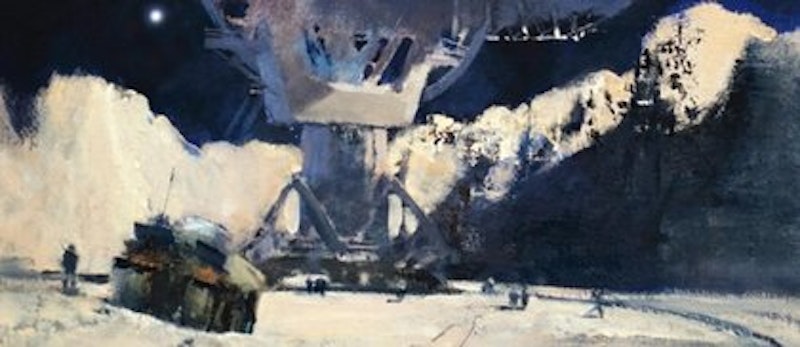If I had to sum up Ben Bova’s Farside in a phrase, "space opera, beach-read porn" would probably work. I should’ve known better than to read it, of course; 1994's virtual-reality morality play Death Dream was straight fluff to me at 18, and I let myself get suckered into one of Bova's Mars novels for a couple dozen pages before checking out. At its core, his mammoth oeuvre—Bova's Wikipedia page will blow your ever-loving, Star Trek stoned mind, yo—seems to stretch the skin-deep concept fiction of Michael Crichton through various far-flung sci-fi wormholes. High, just out of reach concepts are hung on characterizations so transparent and thin that they make Isaac Asimov's fantasias look like Anton Chekhov’s by comparison. Blame it on circumstance: I'd just joined a new library, didn't have much time to spend there but was desperate to read something new, pickings were slim, and there Farside sat, horrible photo-impressionist sleeve beckoning me to sup on mass-market trash with little to no value.
If there's anything worth appreciating about this kind of utilitarian sci-fi, it's how unflinchingly realistic the future seems. There is a tendency, in the popular imagination, to picture the future as some sort of agreeable post-war, post-self-interest utopia where everybody willingly strives as one for the common good en route to betterment and enlightenment for all mankind. Farside eschews such altruism. A pair of Moon-based scientific societies are competing to build space telescopes that will reveal more about a distant planet popularly known as "New Earth"; early indications suggest that its atmosphere and foliage mirror those of our world, and the scientific community aches to learn more. Earth has been ravaged by those global warming-consequence floods and weather shocks we're all dreading so much; life there sucks enough that there's some actual appeal in dwelling on a cold, airless rock where you have to wear a space suit to venture outside.
If you want to view all of this through the lens of Catholicism, Earth is Hell, the Moon is Purgatory, and New Earth is an unspoiled Heaven way, way, way beyond humanity's reach, a beckoning Pandora hanging in the distant cosmos like a precious jewel. Farside, of course, presages the baby steps with the homo sapien schlock of stock archetypes: the mournful, haunted lead engineer, the doe-eyed, green astrophysicist, the playboy scion of a rich industrialist, the engineering team slut, the rule-bending space physician, the rich industrialist's former booty-call turned rich industrialist who's carrying the mother of all grudge, the blind arrogant senior astrophysicist angling for a Nobel Prize.
Greed, fear, resentment, and revenge power every impulse here: the playboy scion wants to bed everything in sight, the lead engineer got blamed for flood refugee deaths on back on Earth, is addicted to steroids, doesn't want to blow his deal, the nanomachine specialist is unnaturally youthful because she hops herself up on nanomachines, but that means she can't return to her family on Earth, and so on. The food is in-vitro and fake. It's hard to envy any of these people, unless the idea of being on the Moon excites you.
Bova telegraphs his chess moves so openly and plainly that it can be painful at times: we're given just enough background on the cannon fodder to peg him as such, an associate villain is painted early on as a slothful, resentful dick. In a book about moonbases, when major and minor characters chew scenery about the horrors rogue nanomachines have wrought on terra firma—where they're banned—rough nanomachines will inevitably fuck shit up at the moonbase, even as benign nanomachines are in use on the moon in all kinds of functionally useful ways.
Crichton's insipid Prey played nanotech as utter fanatical nonsense, so there's some satisfaction in reading Bova play the procedural card in Farside. The scenes where everyone's logically thinking through the size of the nano holes in suits, airlocks, and tubes, examining residue, and figuring out what elements the nanos were going for put me in mind of C.S.I. or NCIS. And despite the goofiness of the set-up, the author suckers you—via bite-size chapters and the occasional cliffhanger—into caring enough about his stick figures to see the thing through to the end.
As when I was watching Avatar, I caught myself wondering what life on Earth must be like in this paradigm, wanting more of that. Bova's Wikipedia page suggests that he's trod that ground in previous novels. But I don't know: if there's a charm to a book like this, it's having one's sense of wonder and possibility tickled intellectually; it's not like sitting down with The Great Gatsby or a Philip Roth novel. This is pop sci-fi commerce, not art, and life is too short to spend too much time in Bova's company when there's literature to consume. Plus, you know, Bova's almost-inevitable New Earth is out next month—one guess what that's about—and I'm not sure I'm going to be able to stop myself from reading at least the first few pages.

